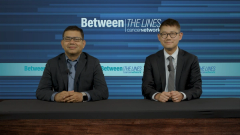
Real-World Data From IMS: Outpatient/Hybrid Step-Up Dosing in Relapsed/Refractory Multiple Myeloma
Experts discuss new real-world data supporting the safety and effectiveness of outpatient and hybrid step-up dosing of teclistamab in relapsed or refractory multiple myeloma, showing strong response rates, durable disease control, and manageable toxicity and reinforcing the feasibility of administering bispecific therapies beyond inpatient settings and expanding access in community care.
Episodes in this series

This study adds important real-world evidence supporting the feasibility and safety of outpatient and hybrid step-up dosing of teclistamab for patients with relapsed or refractory multiple myeloma. With over 220 patients included and a sizable outpatient/hybrid subgroup, it provides a robust look at how bispecific therapies can be transitioned out of strictly inpatient settings. Patient characteristics were well-balanced across groups, and most patients had similar performance status and disease risk features, reinforcing the relevance of the comparisons.
Effectiveness outcomes in this cohort were encouraging. The overall response rate reached nearly 70%, with even higher responses in the outpatient/hybrid subgroup. Median progression-free survival was not reached in the hybrid group, indicating durable disease control. These findings mirror or even slightly exceed the outcomes seen in clinical trials, offering reassurance that outpatient or hybrid models can maintain efficacy while improving patient convenience and health care system efficiency.
Safety data from this analysis were similarly favorable. Rates of cytokine release syndrome were comparable or slightly lower in the outpatient/hybrid group, with most events being low-grade. Immune effector cell–associated neurotoxicity syndrome was rare, and infection rates remained manageable, likely due to the widespread use of prophylactic strategies. Discontinuation rates were minimal, suggesting that patients tolerated treatment well in these alternative care settings. Overall, this study underscores that with appropriate protocols and monitoring, step-up dosing of teclistamab can safely and effectively be performed outside the hospital, paving the way for broader adoption of bispecific therapies in real-world community practice.
Newsletter
Stay up to date on recent advances in the multidisciplinary approach to cancer.




































